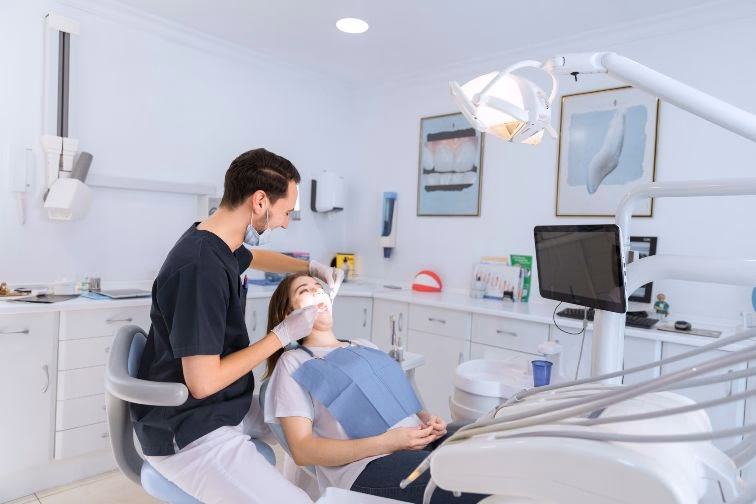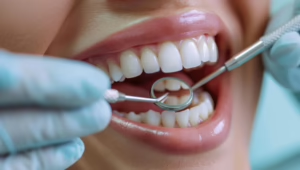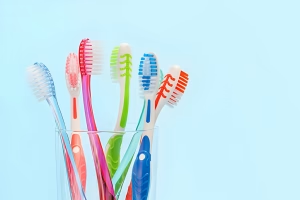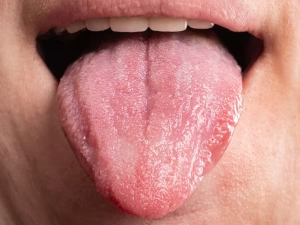Deep Cleaning of Teeth – What Is It and When You Should Do It
27 January 2021

Most people usually think of deep cleaning of teeth as something you can do at home, especially after a messy meal or before you go to visit your dentist. However, that is not the case at all, as dental deep cleaning is more than mere flossing or brushing of the teeth.
Deep teeth cleaning is really a regular dental procedure, done by a professional dental hygienist, so definitely not something you can or should do by yourself. Dental deep cleaning is intended to treat gum or periodontal disease.
This procedure is usually advised for people who skipped several dental appointments and need to thoroughly and efficiently clean their teeth. Also, it may be recommended for anyone who has gum disease or periodontal issues as an efficient way of treatment.
What Is Deep Dental Cleaning
So, what is dental deep cleaning?
A dental deep cleaning is known as gum therapy and dentists often referred to it as root planning or gum scaling. It is a dental treatment created to fully clean between the gums and teeth, reaching all the way down to the roots.
Compared to a standard dental cleaning where the dentist washes the front, back, and sides of your tooth (basically everything above your gumline), dental deep cleaning provides a more detailed approach to teeth cleaning.
During a deep dental cleaning, the same process is (washing of front, back, sides of the teeth above the gumline) is performed. Only this time, the dentist extends cleaning down to the root of the tooth, so below the gumline. This helps remove tartar and other build-ups from your “pocket” that usually form between the gums and the root of the tooth.
When is Deep Cleaning of Teeth Necessary?
Is deep cleaning teeth necessary? Yes, it is necessary, as it can help with the treatment and prevention of some regular dental issues like gingivitis or periodontitis.
Usually, a dentist will suggest dental teeth cleaning after taking X-rays o your gums and teeth and assessing the overall health of your mouth.

If your gums are infected, or your gingivitis reached the point where your gums are pulling away from your teeth, a deep dental cleaning is regularly advised as the next logical step before actual periodontal surgery.
Keep in mind that if your gingivitis or other gum problems aren’t fixed, they may grow into periodontitis, which can result in severe problems. The openings between your teeth and gums can become so deep, that the bacteria starts to influence the exposed bone and supporting structures of your teeth.
If left untreated, this may lead to your becoming teeth lose, enough to require extraction or even fall out by themselves.
Deep teeth cleaning procedures can help decrease the size of the pockets and reduce or fully stop the progress of gingivitis and other gum diseases.
Deep Teeth Cleaning Procedure
The deep cleaning procedure consists of two parts:
- Scaling – removes all the tartar and plaque from under the gumline.
- Root planing – removes tartar, plaque, and any build-ups from the roots of your teeth.
Both scaling and root planning can be done using electric or ultrasonic tools or standard dentist scaling tools. Sometimes, dentists may use a combination of the two.
When it comes to your teeth, a deep cleaning procedure commonly includes two separate visits to your dentist. Obviously, the first one is for the teeth scaling and the second one for the root planning. Both of the procedures help in the treatment of gum disease like gingivitis, preventing it to become more severe.
Teeth Scaling
Gum Scaling, perio scaling, or simply teeth scaling is the first part of the dental deep cleaning procedure.
On your first appointment, your dentist will remove all the tartar and plaque build-up from over and under your gum line, working all the way toward the bottom of the pocket or area between your gums and teeth.
This procedure is an introduction to the next step of dental deep cleaning – root planning.
Root Planning
Root planning is the second part of the dental deep cleaning process, which includes smoothing out and polishing the roots of your teeth.
This enables your gums to reattach to your teeth, which decreases the size of the opening and helps your mouth to return to its natural healthy position.

Keep in mind that root planning may need more than one visit to the dentist, to finish the process. This often depends on the size of the damage.
While performing both gum scaling and root planning, your dentist will probably use a local anesthetic or mild sedative to ease the pain.
Benefits of Deep Cleaning Teeth
The benefits of deep cleaning teeth procedures like this are to prevent gum diseases like gingivitis from growing into more serious problems.
We all have lots of bacteria in our mouths, even if our gums and teeth are perfectly healthy. Plaque forms naturally when bacterias in our mouth mix with food, but usually plaque is eliminated by daily brushing and flossing.
However, if plaque is not removed by regular home remedies it can turn into tartar, and the only way to remove it is to seek professional dental cleaning. The long presence of tartar on your teeth may lead to gingivitis, halitosis (bad breath), sensitive teeth, and reduced gumline.
Routine check-ups with your dentist and dental deep cleaning may eliminate bacteria build-ups in your mouth, reducing the chance of severe dental issues.
Dental Deep Cleaning Side Effects
Gum therapy is a low-risk method, particularly when done by an expert dentist. However, there are several dental deep cleaning side effects that may occur after this procedure:
- Fillings in your teeth may become loosened and even pop out.
- Risk of access if an extremely small piece of tartar stays trapped between tooth and gums.
- Teeth sensitivity (it goes away within 2 weeks with proper oral hygiene)
- Pain, swelling, and soreness (usually lasts for the rest of the day of the procedure)
Deep Cleaning Teeth Aftercare
When it comes to deep cleaning teeth aftercare it is advised to be extra gentle with your teeth and gums, especially in the first couple of days after the procedure.

Keep them as clean as possible (flossing, brushing, mouth washing), and take any medicines prescribed by your dentist. Also, eat soft food and avoid cold drinks due to increased sensitivity of teeth and gums.
Of course, it is important to stress to always consult and visit your dentist, do a follow-up check-up, and plan routine cleanings in the future.












